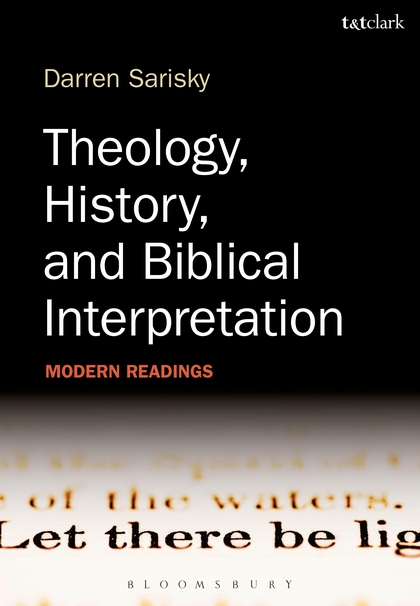Darren Sarisky: Theology, History, and Biblical Interpretation
 Darren Sarisky, Theology, History, and Biblical Interpretation: Modern Readings (London: Bloomsbury T&T Clark, 2015), 490 pages.
Darren Sarisky, Theology, History, and Biblical Interpretation: Modern Readings (London: Bloomsbury T&T Clark, 2015), 490 pages.
Darren Sarisky received his PhD from King’s College Aberdeen, UK, and he currently holds a position as Junior Research Fellow at the University of Cambridge, UK where he also teaches Christian Doctrine. Presently, there is an upheaval over theological interpretation, with some backlash occurring against this seemingly new development. In this confusion, it is not clear what the differences and similarities are between historical and theological approaches to the Bible. In so doing, it gathers together several classical and contemporary statements of the differences and similarities between historical and theological approaches to the interpretation of the Bible. Theology, History and Biblical Interpretation is a collection of twenty seminal essays that reflect the state of historical vs. theological interests over the past two hundred years of biblical interpretation from the Enlightenment to the present day.
Sarisky realizes that there is both a theological and historical aspect to the text of the Bible, and this reader focuses on the question of which factors drive the process of reading, and especially how historical and theological coefficients combine harmoniously (at least that is the ideal scenario). There is a broad movement in the Academy today over the theological interpretation of Scripture. Systematic theologians, for example, are increasingly turning to Scripture, whereas in the past they have might have dialogued more so with other theologians or philosophers, and they are producing their own commentaries that reflect engagement with biblical exegesis. Moreover, mainstream biblical scholarship is giving greater attention to theological questions that the text under investigation raises, and a number of contemporary texts have been published that prioritize theological issues. In addition, historical scholars increasingly are focused upon the role of exegesis in past doctrinal debates. Miroslav Volf has commented that the return of biblical scholars to the theological reading of the Scriptures, and the return of systematic theologians to sustained engagement with biblical texts – in sum, the return of both to theological readings of the Bible – is the most important development in the late twentieth century. Volf’s comments are apropos to this volume. These trends raise the question immediately of what theological interpretation actually is. What is the rationale for each approach? Do the approaches conflict, or can they effectively be reconciled?
This reader encourages both students and scholars to explore these important questions by bringing together some of history’s most influential discussions of the issues as well as some of the most distinguished attempts of the contemporary era. Indeed, Sarisky indicates that a grave problem results from absolutely differentiating between the two approaches, theological and historical. A theological reading, after all is also historical by definition. Instead of polarizing theology and history, this reader seeks to approach texts with a different question in mind: how do theology and history function within the account of interpretation that the author is proposing? Sarisky notes that any account of interpretation involves some phenomenon to be interpreted, someone who is available to interpret that phenomenon, and some interaction between these first two realities.
Category: In Depth, Summer 2016


